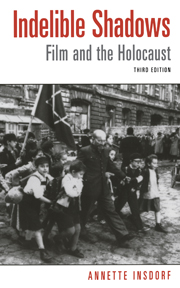Book contents
- Frontmatter
- Contents
- Foreword by Elie Wiesel
- Preface
- Introduction
- I Finding an Appropriate Language
- II Narrative Strategies
- 5 The Jew as Child
- 6 In Hiding/Onstage
- 7 Beautiful Evasions?
- 8 The Condemned and Doomed
- III Responses to Nazi Atrocity
- IV Shaping Reality
- V Third Edition Update
- Annotated Filmography (Third Edition)
- Filmography (Second Edition)
- Notes
- Bibliography (Second Edition)
- Bibliography (Third Edition)
- Relevant Websites
- Index
8 - The Condemned and Doomed
Published online by Cambridge University Press: 14 January 2010
- Frontmatter
- Contents
- Foreword by Elie Wiesel
- Preface
- Introduction
- I Finding an Appropriate Language
- II Narrative Strategies
- 5 The Jew as Child
- 6 In Hiding/Onstage
- 7 Beautiful Evasions?
- 8 The Condemned and Doomed
- III Responses to Nazi Atrocity
- IV Shaping Reality
- V Third Edition Update
- Annotated Filmography (Third Edition)
- Filmography (Second Edition)
- Notes
- Bibliography (Second Edition)
- Bibliography (Third Edition)
- Relevant Websites
- Index
Summary
Among the Italian films that deal with the postwar legacy of the Holocaust, at least three explore guilt in an upper-class family eroded and ultimately doomed by its accumulated ghosts. The major elaborators of this theme are Luchino Visconti (Sandra and The Damned) and Vittorio De Sica (The Condemned of Altona and The Garden of the Finzi-Continis), directors particularly sensitive to history's weight on individuals. For these two filmmakers, who began their careers as neorealists shooting nonprofessional actors in the street, and ended with sumptuous period adaptations (The Innocent and The Voyage), the past is often a burden that individuals must comprehend and then surrender – lest they become prisoners of history. Liliana Cavani's The Night Porter presents a variation on this theme of imprisonment by the past. In Visconti's Sandra (Vaghe Stelle dell'Orsa), for example, the heroine maintains, “We have no ghosts.” The 1965 film itself illustrates the contrary, denying her claim with an abundance of both literal and figurative shadows.
Sandra (Claudia Cardinale), a beautiful young Italian Jewess married to the American Andrew (Michael Craig), returns from a chic modern environment in Geneva to her family home in the crumbling hill town of Volterra for a dedication ceremony: the statue of her father – who died in Auschwitz – is to be unveiled. Her brother Gianni (Jean Sorel) also returns, a troubling and troubled erotic presence vis-á-vis his sister. Sandra believes that her Gentile mother (Marie Bell) and the lawyer Gilardini (Renzo Ricci) denounced her father during the war, and eventually confronts each of these characters.
- Type
- Chapter
- Information
- Indelible ShadowsFilm and the Holocaust, pp. 125 - 136Publisher: Cambridge University PressPrint publication year: 2002



